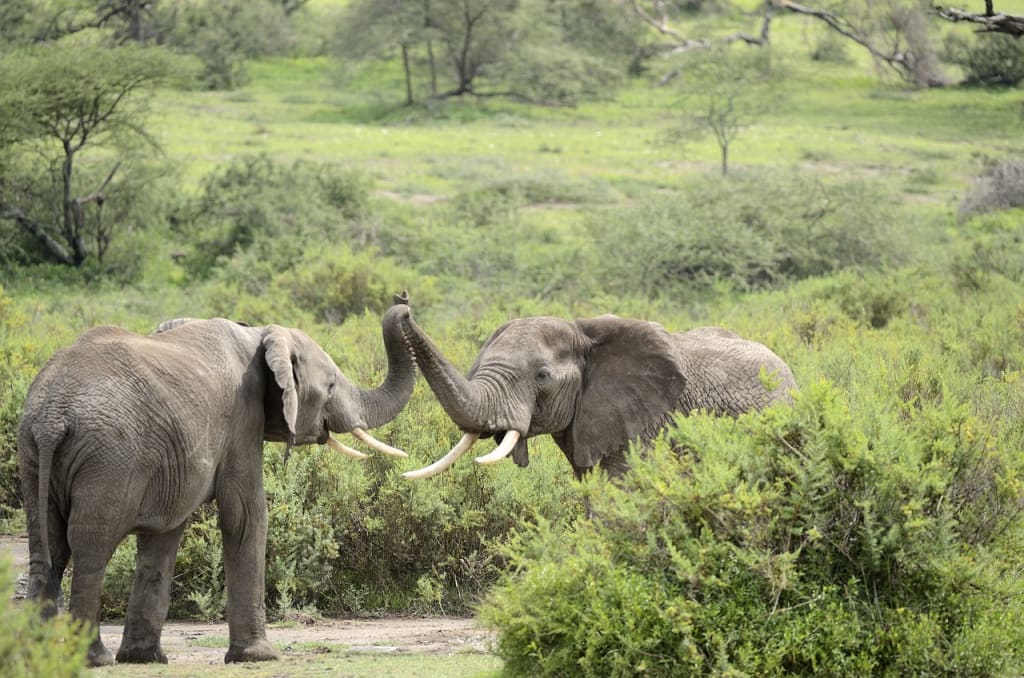Elephants' Essential Role in Earth's Tapestry: The Majestic Connection
Guardians of the Wild: Protecting Elephants from Threats

Introduction:
Beyond their physical presence, elephants, the gentle giants of the animal kingdom, have a deep bond with the natural world. These amazing animals, whose depth of passion and intelligence has fascinated humans for ages, are essential to preserving the delicate balance of ecosystems. For the sake of these magnificent creatures as well as the health of the earth, it is essential to comprehend the significance of elephants in relation to nature, their emotional potential, moral issues, and the necessity of keeping them safe.
The innate relationship:
As keystone species, elephants influence their surroundings in ways that are vital to the survival of other species. They shape landscapes, make water holes, and spread seeds as part of their job as ecosystem engineers, greatly enhancing the diversity and vitality of of the places they call home. Their relationship with nature is a dynamic interaction that has developed over millions of years, not just a simple life.
Inner Depth:
Elephants have a deep inner world that lies under their rough demeanor and enormous bulk. Elephants may feel a wide spectrum of emotions, from fun and happiness to sadness and mourning, according to studies. They show empathy and cooperation as they develop strong social relationships within their herds. Elephants have been seen to develop emotional ties and even exhibit altruistic behavior with other species, proving that these relationships are not just felt by members of their own species. Their profound emotional intelligence highlights how crucial it is to acknowledge them as sentient entities with complex interior lives.
Effect on People Who Live in Forests:
Elephants are not only animal neighbors for the native and indigenous populations who live in the forests; they are sentient creatures with whom they share their everyday existence. Elephants' emotional intelligence serves as a link between the animal and human realms, impacting these societies' cultural norms. In the local folklore, elephants are frequently held in high regard as representations of power, knowledge, and harmony with the natural world.
Elephants are honored for their contribution to preserving the forest's ecological equilibrium during periods of plenty. Their migrations throughout the landscape improve the general health of the ecosystem by aiding in vegetation management and seed dissemination. The people who live in the forest understand and value this symbiotic connection, which helps them feel grateful for the elephants' existence.
Obstacles Coexistence:
Nevertheless, there are difficulties with the emotional bond that exists between populations living in forests and elephants. Resources are a cause of conflict as human populations increase. Elephants may wander into farming regions, causing damage to crops and, thus, causing revenge from impacted populations. These disputes upset the fragile emotional equilibrium and may lead to people's unfavorable opinions of elephants among those who live among them.
A comprehensive strategy that recognizes the emotional connections between forest-dwelling populations and elephants is needed to address these issues. Initiatives for conservation must incorporate tactics that improve the welfare of both humans and elephants, in addition to conflict mitigation. This entails putting into effect sustainable farming methods, establishing buffer zones, and supporting neighborhood-based conservation initiatives that honor elephants' cultural and emotional value.
Ethics of Elephant Conservation:
The moral issues pertaining to elephants include both how they are treated and in captivity as well as the conservation initiatives put in place to save wild populations. Worldwide ethical issues have been raised by exploitative activities including the poaching of ivory and the usage of elephants in the entertainment industry. Ethical actions that respect these animals' natural habits and well-being must be given top priority in conservation initiatives.
Keeping Elephants Out of Peril:
Elephant safety and well-being depend on a multifaceted strategy that tackles both immediate hazards and more general conservation issues. Elephant poaching for their ivory tusks, which feeds the illicit wildlife trade, is the biggest danger to these animals. To counter this threat, community engagement, international cooperation, and strict law enforcement are essential. Significant risks can stem from confrontations between elephants and local communities as well as habitat loss brought on by human activity.
Encouraging communities and elephants to live together entails putting into practice strategies like early warning systems, safe fencing, and neighborhood-based conservation projects. Campaigns to raise awareness and promote understanding are crucial to gaining support for these policies. Conservation initiatives can also benefit from sustainable tourism practices that put the welfare of elephants and their habitats first.
Strategies for Conservation:
Elephant conservation plans that are effective must address the underlying causes as well as the current challenges. Strong anti-poaching initiatives are essential, as is international collaboration to break up illegal wildlife trading networks. For long-term success, funding for the preservation and restoration of elephant habitats is essential, as is community involvement and education.
By giving real-time information on elephant movements and assisting in the identification of possible dangers, the incorporation of technology, such as GPS tracking and satellite monitoring, can improve conservation efforts. Research collaborations between scientists, conservationists, and indigenous groups can enhance conservation tactics and guarantee their pertinence to the distinct requirements of individual elephant populations.
In summary
Elephants are not only amazing animals but also an essential part of the complex web of ecosystems on Earth. It is morally necessary to safeguard and preserve them for future generations because of their depth of feeling and intelligence. Humanity can aid in the preservation of these gentle giants and the planet's greater biodiversity by recognizing the deep relationship that elephants have with the natural world, putting ethical conservation principles into practice, and tackling the myriad challenges that elephants face. By doing this, we foster a peaceful coexistence between people and the magnificent creatures that inhabit our earth in addition to protecting the elephants.
About the Creator
Ashwatha K
>Writes down article just to explore
>Check out my Article if you are a person who is interested in humanity, history, science, skincare stuffs
>let's share our knowledge with each other and wrap up ourself
>Spread positivity🦋☘️






Comments (1)
Great. Love to know that elephants have feelings. We should also have? Ashwatha, I love your words. Warm wishes